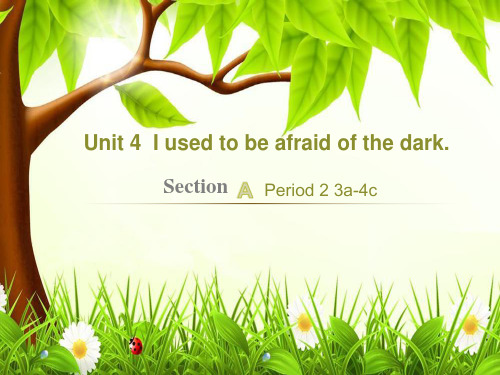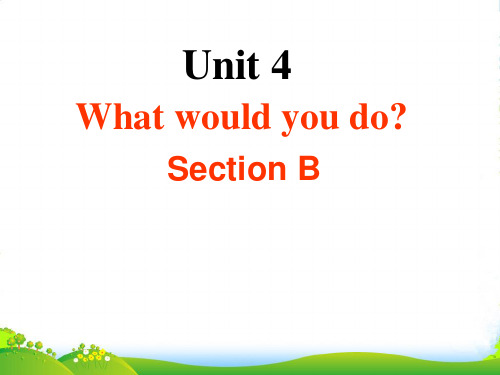九年级同步英语第四单元精讲pdf
人教版九年级英语 Unit 4 Section A(3a-4c)课件

Use used to and now to
describe the following pictures.
I used to … But now I …
keep toys in order
Go home early Have a little homework
Go home late Much homework
4a Write sentences about the past
using used to.
2. my mom / have curly hair / have strMayigmhotm huasierd to have curly hair.
或:didn’t use to do
疑问形式为:Used … to …?
to …?
或:Did … use
You used to be quiet, didn’t you?
你以前很文静,是不是? 反意疑问句: 陈述句, didn’t / usedn’t +主语?
Talk about your own past and present
4. Sandy / teach British English / teach American English
Sandy used to teach British English. She didn’t use to teach American English.
4b Look at the information and write sentences about Emily.
Unit4SectionB1a-1e课件人教版英语九年级全册

I __l_o_v_e____ P.E. class.
1. 这个小女孩以前害怕在别人面前跳舞。
The little girl used to be afraid of dancing in public.
2. 以前,这村子附近有一所幼儿园。used to do sth. 过去常常做某事
When I was a child, I used to be afraid of watching scary movies. But now, I am fond of watching scary movies.
be afraid of doing sth. be fond of doing sth.
Did you use to like this when you were a child How often did you use to do this
catching ants
watching insects
1a Check (√) the things you used to like when you were a child.
D. used like
II. 根据汉语意思完成句子。(每空一词)
她过去经常穿黑色的衣服。 She u_s_e_d__t_o____w_e睡着了。 the radio on
I fell asleep last night with _____ ______ _____. 3. 他过去喜欢晚上工作, 不是吗d?idn’t he
When I was a child, there were a small number of houses in the village. When I was a child, there used to be a small number of houses in the village. There are a large number of houses in the village now.
九年级英语 Unit4 课件人教

2a Listen. Celia is asking Bill questions from a personality survey. Check (✓) the questions Celia asks.
How confident are you?
✓ What would you do if the teacher asked you to give a
E. Creative If you are
creative, you use your imagination or skills to make things.
1a Fill in the blanks in the sentences below with words from the box. outgoing energetic shy confident creative 1. Confident people aren’t afraid to speak in public. 当众, 公然 e. g. Don’t speak in public. 2. Outgoing people like to meet new people.
speech in front of the whole school?
What would you do if your brother borrowed your clothes without permission?
未经允许
✓ What would you do if someone asked you to be in a
a. I’d say that another student could do it better. b. I’d say I had a cold. c. I’d say yes.
人教版2020九年级英语上册 Module 4 Home alone词句精讲精练 (新版)外研版

Module 4 Home alone词句精讲精练【词汇精讲】1. missmiss为动词,意为“想念,思念”。
例如:I’ll miss you when you go to Canada. 你到了加拿大以后,我一定会想你。
【拓展】(1) miss作动词还有“未击中,未抓住”的意思。
例如:I tried to hit the ball but I missed. 我努力地想击中球,但却未成功。
(2) miss还可意为“未赶上,错过”,是动词。
例如:I missed the football match on TV last night. 我错过了昨天晚上电视中的足球赛。
(3) miss与like; mind; finish; enjoy; practice; be busy; stop; can’t help; give up等词一样后接动词的-ing形式。
例如:I don’t want to miss seeing that film on television tonight.我不想错过今晚在电视上看那部影片的机会。
2. hand inhand in是固定搭配,意为“上交;交出”,hand在此处为动词。
例如:— Must he hand in his homework this morning? 他必须今天上午交作业吗?—No, he needn’t. 不,不必了。
hand还可以作名词,意为“手”。
例如:Mike put his hand up three times during the class.在这节课内,Mike举了三次手。
Did you notice his hand shaking?你有没有注意到他的手在抖?3. though(1) though可以作连词,意为“虽然;即使;纵然”,放在从句的开头和中间均可。
例如:Though it was raining, we were still working. 虽然下着雨,但我们仍然坚持工作。
Unit 4 Section B (2a-2f) 课件2023-2024学年人教版九年级英语全册

seldom caused problem
He Studies Harder than He Used to
Background
After leaving Go parents
parents,
moved to the city
grandparents, took care of him
lonely, unhappy
be proud of/take pride in make a decision/decide miss/be absent from change/influence look after/take care of
Li Wen is a 15-year-old boy. He works hard and does well in school. It is hard to believe that he used to have difficulties in school. When his parents moved to the city to work, they could not be
more outgoing and active happier
• made some good friends • joined the school basketball team • works harder
Retell
Li Wei, a 15year-old boy
works hard, does well in
and unhappy.
boy 15 the countryside
He works hard and does well
He used to have difficulties in school
Unit 4 Section B 1a-1e 课件 人教版九年级英语全册

play basketball swim
watch TV bike riding
Check (√) the things you used to like when you were a child. Write sentences.
I used to like P.E. class.
_______ P.E. class
I used to like painting pictures. ______ painting pictures
I used to like music class. _______ music class
I used to like ants and other insects. ______ ants and other insects
Listen and check (√) the sentences you hear.
1. __√__ I didn’t use to like tests.
2. ____ We used to walk to school.
3. __√__ I used to hate P.E. class.
Read and imitate, especially the pronunciation, stress and intonation.
Compare yourself with your partner.
I used to be nervous about tests all the time. What about you?
I used to like …
What other things did you use to like when you were a child? Discuss them with a partner.
人教版英语九年级全册 Unit4 SectionA(3a-4c)课件
From Shy Girl to Pop Star
3 What does Candy have to say to all those young people who want to become
famous? "Well," she begins slowly, "you have to be prepared to give up your
• when she was 19,
,
the second album won the 52nd Grammy Award (格莱美)annual
ablum, making Taylor the
youngest singer to win the award,
and also the most awarded
4c
Which of these things did you use to be afraid of? Which onesare you still
afraid of? Check the boxes and then ask your partner.
Me
My partner
the dark being alone flying high places giving a speech in public
4b
Look at the information and write sentences about Emily.
1.Emily used to listen to pop music, but now she enjoys country music. 2.Emily used to watch scary movies, but now she hates them. 3.Emily didn’t use to read a lot of books, but now she reads at least six books a year.
初三英语全册Unit4Whatwouldyoudoreading课件人教新目标版
•c、You should drink lots of water and ask your doctor for advice.
•5. You’re always tired. If • you_•d_i_d_n_’_t___( not go) to bed so late • evergyonight ,you wouldn’t be tired all • the time. •6. If I were you, I•_w_o_u_l_d_n_’_t ____ (not • wait). I•_w_o_u_l_d__gw_oa_it(go) now.
•1、What would you do if you cut yourself by accident?
•2、If my grandmother fell downstairs and wasn’t moving ,what would I do ?
•3、What would you do if you burned yourself by accident?
•He fell downstairs and wasn’t moving. •What would you do if he were your brother?
What would you do if your brother fell downstairs and wasn’t moving.
•Brains •英语建议句型大荟萃 •--Lteto’srgmet on the bus!---All right.
- 1、下载文档前请自行甄别文档内容的完整性,平台不提供额外的编辑、内容补充、找答案等附加服务。
- 2、"仅部分预览"的文档,不可在线预览部分如存在完整性等问题,可反馈申请退款(可完整预览的文档不适用该条件!)。
- 3、如文档侵犯您的权益,请联系客服反馈,我们会尽快为您处理(人工客服工作时间:9:00-18:30)。
examination n. 考试;审查
in person 亲身;亲自
She did well in her examinations.
He thanked his audience in person. Your answer is exactly right. He took pride in his school record.
Байду номын сангаас
He had a wide mouth and
If I keep silent then the next day it will be my I got some helpful advice from my teacher. She has to work at weekends from time to
The final score was 4-3.
I found the historical background to the war.
interview v. 采访;面试 n. 面试;访谈
Asian adj. 亚洲的;亚洲人的 n. 亚洲人 Asians. deal with对付;应付 shyness n. 害羞;腼腆 disappears. dare v. 敢于;胆敢
influence v. & n. 影响 ?
absent adj. 缺席;不在
What is the influence of television on children
Tom is absent on illness.
seldom adv. 不常;很少 He is always planning but seldom carries through with any of them.
be used to doing 习惯于
He is used to living in the city.
He used to play basketball, but now he is used to playing football.
反义疑问句,“前肯后否/前否后肯”原则
He’s seen the painting before, hasn’t he?
introduction n. 介绍 introduction.
In the morning, the new student made a self
used to do 过去常做
He used to play basketball.
be used to do 被用作
The flowers are used to decorate the room.
The dog was guarding its owner’s
guard n. 警卫;看守 v. 守卫;保卫 luggage. require v. 需要;要求 patience.
Solving the problem requires some time and
European adj. 欧洲的;欧洲人的 n. 欧洲人 African adj. 非洲(人)的 n. 非洲 人 There are many Africans in European countries now.
British adj. 英国的;英国人的 speech n. 讲话;发言 audience.
He has a British accent.
His speech made a strong impression on the
public n. 民众 adj. 公开的;公众的 in public 公开地;在别人(尤指生人) 面前 She doesn’t like to be seen in public without her make-up on. ant n. 蚂蚁 insect n. 昆虫 Ants and flies are insects.
I heard him singing when I was reading a book.
hear/see/notice sb. do sth. 做某事
I saw him wash the car.
被动:
He was heard singing.
He was heard to wash the car.
the number of n.(复数)……的数量
The number of the students in my class is 45.
名词性从句
句子中的名词:主语/宾语/表语/(同位语)
Apples are delicious. Everyone like apples. These are apples.
Who do you want to interview?
Many of the shops were run by
So how do we deal with these new challenges? When he sees his friends, his shyness often
People dare to speak in public now.
crowd n. 人群;观众
She lost her son in the crowd.
ton n. 吨;(pl.)大量;许多
They’ve got tons of money.
private adj. 私人的;私密的 private bathrooms.
The hotel has twenty bedrooms, all with
U4:I Used to Be Afraid of the Dark.
跟谁学 中考英语讲师 贾菲菲
humorous adj. 有幽默感的;滑稽有趣的 humorous eyes. silent adj. 不说话的;沉默的 child. helpful adj. 有用的;有帮助的 from time to time 时常;有时 time. score n. & v. 得分;打分 background n. 背景
主语/宾语/表语从句
When he will come is a question.
Nobody knows when he will come.
The question is when he will come.
take up “开始从事”、“占据;占用(时间、空间)”
He took up singing as a hobby.
WeChat takes up a lot of my time.
a number of n.(复数) 大量的……
A number of books are put in the library.
exactly adv. 确切地;精确地 take pride in 为……感到自豪
be proud of 为······骄傲;感到自豪 and they should be.
They were proud of their work, Just tell me the general idea
general adj. 普遍的;常规的;总的 n. 将军 of the story.
He hardly gets up early in the morning, does he?
肯定回答:Yes,+肯定;否定回答:No,+否定
—You don’t know him, do you?
—Yes, I do.(我知道)
—No, I don’t.(我不知道)
hear/see/notice sb. doing sth. 正在做某事
